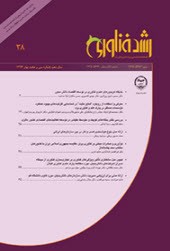ارائه مدل بلوغ هوشمندی کسب و کار در بین سازمانهای ایرانی
محورهای موضوعی : زيرساختهاي توسعه فناوري و نهادهاي پشتيبان توسعه فناوريمحمد حسین رونقی 1 , مرضیه رونقی 2
1 - -
2 - -
کلید واژه: بلوغ سیستمهای هوشمندی کسب و کار, کیفیت دسترسی اطلاعات, کیفیت محتوایی اطلاعات.,
چکیده مقاله :
هوشمندی کسب و کار تنها یک ابزار نیست بلکه معماری است و در راستاي شناسايي، جمعآوري، پردازش و نتيجهگيري از دادهها فرایندهای مختلفی طی میشود و از ابزارهای متفاوتی استفاده میکند. ارزش واقعی هوشمندی کسب و کار زمانی خواهد بود که بتوان با تصمیمات اتخاذ شده بر اساس نتایج حاصل از هوشمندی کسب و کار به سادگی فرایندهای سازمانی را مدیریت کرد و قوانین کسب و کار جدید را اعمال نمود. در دهه کنونی بهکارگیری سیستمهای هوشمند کسب و کار به عنوان مزیت رقابتی و یک ابزار جدایی ناپذیر تصمیمگیری در سازمانها تبدیل شده است. اثربخشی و بلوغ هوشمندی کسب و کار در یک سازمان موجب مدیریت بهتر فرایندهای اطلاعاتی وکسب و کار خواهد شد. این پژوهش با هدف ارزیابی ارتباط بین سطح بلوغ سیستمهای کسب و کار با عواملی چون کیفیت دسترسی اطلاعات و کیفیت محتوای اطلاعات انجام شده است. پژوهش از نوع توصیفی پیمایشی است که در بین 50 سازمان ایرانی که به طور مشخص سیستمهای هوشمندی کسب و کار را به کار گرفتهاند و از بین صنایع مختلف انتخاب شدند انجام شده است. در انتها مدل نهایی پژوهش تدوین شده است. از جمله نتایج پژوهش میتوان به ارتباط مستقیم و مثبت بین سطح بلوغ سیستمهای هوشمندی کسب و کار و کیفیت دسترسی و محتوایی اطلاعات اشاره کرد.
Business intelligence is a set of theories, methodologies, architectures and technologies that transform raw data into meaningful and useful information for business purposes. BI as a discipline is made up of several related activities, including data mining, online analytical processing, querying and reporting. Companies use BI to improve decision making, cut costs and identify new business opportunities. BI is more than just corporate reporting and more than a set of tools to coax data out of enterprise systems. With today’s BI tools, business folks can jump in and start analyzing data themselves, rather than wait for IT to run complex reports. Evaluating the effectiveness of Business intelligence system is vital to our understanding of the value and efficacy of management actions and investments. This research aims to explain and clarify the inter-relationships and the interaction effects among business intelligence systems maturity and other relevant factors such as information access quality and information content quality. We developed a model of business intelligence systems maturity based on the outcomes of previous researches and semi-structured interviews with experts in information technology. To examine the model a descriptive survey was applied. The survey sample population consisted of 100 randomly taken managers and IT managers who apply Business intelligence system in their companies, according to a cluster random sampling skim. An important part of the results revealed business intelligence systems maturity relates directly with information quality and use of information in business process.


